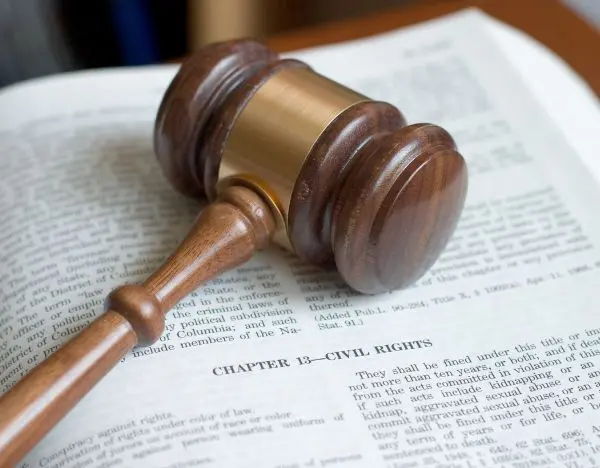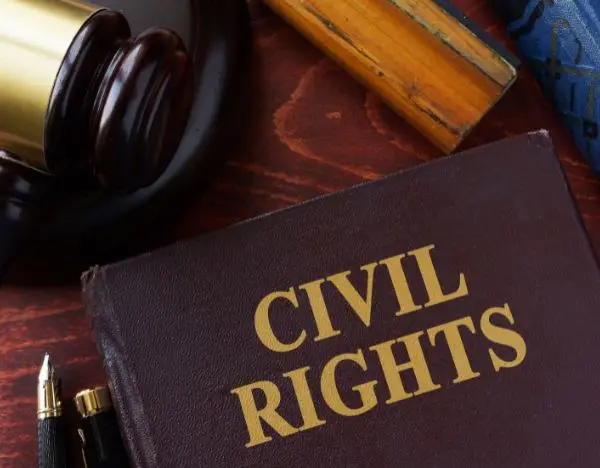
Call Now For A Free Consultation:

Call Now For A Free Consultation:

Think your rights were violated? That’s exactly what we’re here for.
Call (310) 658-8935 or contact us here to speak with a California civil rights lawyer.
Civil rights are fundamental, and protecting these rights is crucial for maintaining the freedoms central to our way of life. A civil rights lawyer plays a vital role in this process, advocating for individuals who have had their rights violated. Here’s a deeper look at the roles and responsibilities of civil rights lawyers like Justin Palmer and how they make a difference in the lives of their clients and society at large.
Call us 24/7 at (310) 658-8935 to speak with a California police brutality lawyer, or reach out online to start your free case review.

A civil rights lawyer is a legal professional with experience in cases related to protecting and violating individuals' constitutional rights and freedoms. Federal, state, and international laws, including the right to free speech, freedom from discrimination, privacy, and a fair trial, among others guarantee these rights.
A civil rights lawyer protects people whose constitutional rights have been violated—often by police, jail staff, or government agencies. At Justin Palmer Law, we handle cases involving excessive force, wrongful death in custody, unlawful arrests, and other abuse of power.
Civil rights lawyers are crucial in maintaining and advancing societal norms around fairness, equality, and justice. They are essential in:
A civil rights lawyer is an advocate for the law and a crucial defender of the principles upon which a fair and just society is built. Whether through litigation, advocacy, or education, these lawyers strive to ensure that all individuals have equal protection and opportunity under the law.
A civil rights lawyer is a legal professional who has experience in protecting individuals' constitutional rights and freedoms. These rights, guaranteed under the Constitution and various federal and state laws, include freedom from discrimination based on race, gender, religion, and other protected characteristics, as well as rights to privacy, freedom of speech, and the right to a fair legal process.
A civil rights lawyer acts as a shield and a spear, defending individuals against rights infringements and actively challenging laws and practices perpetuating injustice. They are essential in the ongoing effort to ensure everyone can live free of discrimination and enjoy equal rights under the law.
Knowing when to seek the help of a civil rights attorney can be crucial to protecting your rights and obtaining justice. Here are several situations where consulting a civil rights attorney is advisable:
If you believe you've been discriminated against based on protected characteristics such as your race, gender, age, religion, disability, or sexual orientation, a civil rights attorney can help. Discrimination can occur in various settings, including employment, education, housing, and access to public services or accommodations.
If you believe law enforcement has unlawfully detained, arrested, or used excessive force against you, a civil rights lawyer can help you determine if your rights were violated. These attorneys are skilled in matters involving police misconduct and can guide you through the process of filing complaints or legal claims.
If you've been prevented from lawfully expressing yourself or assembling, particularly in public spaces or as part of a protest, a civil rights attorney can help you assert your rights. These lawyers can address violations involving censorship or suppression of political expression.
Retaliation can occur when you assert your civil rights, especially if you've complained about discrimination or harassment. If you face negative consequences after such complaints, a civil rights attorney can help protect you from further retaliation and seek remedies for any damages you've suffered.
If you encounter barriers to voting or believe your voting rights have been compromised, a civil rights attorney can help. This includes situations where you may have been unlawfully purged from voter rolls or faced intimidation at the polls.
If you have a disability and face issues with accessibility or accommodations in public places, schools, or workplaces, a civil rights attorney can advocate on your behalf to ensure compliance with relevant laws, like the Americans with Disabilities Act (ADA).
Civil rights attorneys provide representation in court and offer counsel on the potential outcomes of your case and the best steps to take. They can help negotiate settlements or represent you during trials to ensure the best possible outcome for your situation.
Sometimes, the issues at hand are so broad that they require changes to policies or laws. Civil rights attorneys can work to bring about these changes, affecting not just individual clients but also broader communities.
Even if you’re unsure whether your situation legally violates your civil rights, consulting with a civil rights attorney can provide clarity. They can offer a preliminary assessment of your case and advise whether pursuing legal action is the best course of action.
Contacting a civil rights attorney is wise if you encounter any of these situations or are unsure about your rights under specific circumstances. They can provide crucial guidance and support, helping to safeguard your rights and achieve justice.
The system moves quickly—and not always in your favor. Whether it’s deleted footage or altered reports, acting fast gives your lawyer the best chance to secure the evidence and the truth.
Talk to us before the evidence disappears.
Civil rights violations occur when individuals are deprived of their fundamental rights as protected under the Constitution and other applicable laws. Understanding the most common types of civil rights violations can help individuals recognize when their rights are being infringed and seek appropriate legal help. Here are several common types of civil rights violations:
Racial discrimination is one of the most pervasive forms of civil rights violations and can occur in various areas, including employment, housing, education, and access to public services. This involves treating individuals unfavorably because of their race or characteristics associated with race.
This type of violation includes any adverse treatment based on gender or sex. It can manifest in the workplace as unequal pay or opportunities, in education through unequal treatment of students, or in the health care system by denying necessary services that are otherwise provided to the opposite sex.
Violations against individuals with disabilities can occur when they are denied reasonable accommodations at work, in school, or by public services. The Americans with Disabilities Act (ADA) protects against such discrimination, mandating equal opportunities in various aspects of public life.
This occurs when an individual is treated less favorably because of their age. It is most commonly seen in employment settings where older workers may be overlooked for employment or promotion opportunities, laid off, or forced into early retirement.
Discrimination based on sexual orientation or gender identity can affect various aspects of a person's life, including employment, housing, and access to public accommodations. This includes being fired, evicted, or denied service simply because of one's LGBT status.
Police misconduct encompasses a range of illegal or inappropriate actions undertaken by police officers, such as the use of excessive force (police brutality), unlawful detention, racial profiling, and coercion. This area of civil rights violations has received significant public attention, prompting demands for accountability and reform in law enforcement practices.
These violations occur when laws or practices effectively prevent eligible citizens from voting. Common examples include voter suppression tactics like stringent ID laws, reduction of polling places in minority neighborhoods, and purging of voter rolls.
This involves treating someone unfavorably because of their religious beliefs. Examples include workplace discrimination, such as not accommodating religious practices, or zoning laws that make it difficult for religious groups to find places of worship.
Violations against incarcerated individuals can include inhumane treatment, denial of medical care, excessive solitary confinement, and physical abuse. Even while imprisoned, individuals retain certain rights that must be respected.
These occur when individuals are prohibited or penalized for engaging in protected speech or assembly. This can involve censorship, imposing undue restrictions on protests, or retaliating against individuals for their opinions.
Understanding these common violations can empower individuals to recognize when their rights are infringed upon and seek appropriate legal redress. Civil rights lawyers have experience in addressing these issues, advocating for victims to enforce their rights and correct injustices.
Don't stay silent if you believe your civil rights have been violated. Contact Justin Palmer Law today for a consultation. Our experienced team is dedicated to defending your rights and ensuring justice. We'll guide you through every step of the legal process with experience and compassion. Reach out now and take the first step towards protecting your rights and securing your future.
Call us 24/7 at (310) 658-8935 to speak with a California police brutality lawyer, or reach out online to start your free case review.
Attorney Advertising | Prior results do not guarantee a similar outcome. The information on this website is for general information purposes only. Nothing on this site should be taken as legal advice for any individual case or situation. This information is not intended to create, and receipt or viewing does not constitute, an attorney-client relationship. This site is protected by reCAPTCHA and the Google Privacy Policy and Terms of Service apply.